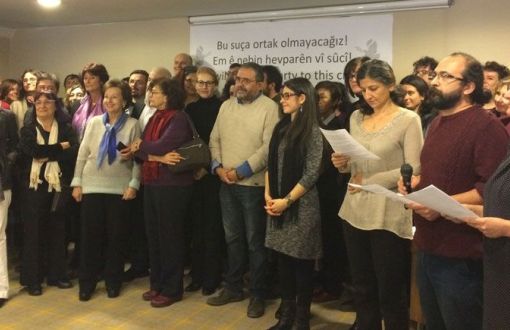Hitman of State: Role of Universities in AKP’s War on Dissident Scholars
The Academics for Peace Petition represented a symbolic gesture to remind the state of its responsibility to provide peace and safety for the citizens. Yet, by rejecting to be a party to the state’s crimes against the Kurdish population, we unraveled a series of other interconnected crimes. The consenting silence of some colleagues and the wholehearted obedience of the administrative cadres at the universities to the brutal crackdown on critical thought rank very high on that list.
To be sure, the submissive relationship of the universities to the state is not a novelty of the AKP era. Yet, within the last two years, the degree of corruption at the universities reached an unprecedented scale. In the wake of the Turkish president Recep Tayyip Erdogan’s defamation of the first 1,128 signatories of the Academics for Peace Petition as ‘traitors’ and his call on the Council for Higher Education (YOK) to take action against this ‘dark and ignorant band’, repercussions have increased, including criminal investigations and university-level disciplinary proceedings against the signatories.
This state-led purge in the universities took another dimension in the aftermath of the so-called coup attempt on 15 July 2016. The consequent declaration of the state of emergency provided the government with almost unlimited power to shut down the opposition by lumping together two different cases and labeling all dissidents as potential Gulenists.
By eliminating qualified oppositional cadres en masse on false accusations, the government is implementing a neoliberal policy of systematic deinstitutionalization in intellectual production. The erosion of critical subjectivity via deregulation and precarization has certainly been underway everywhere for a while now. Yet in Turkey, it found an exceptionally fertile breeding ground due to the inherent corruptibility of the universities.
The actual significance of the Academics for Peace Petition, originally intended as an attempt to bring peace back to the agenda, perhaps lies rather in the fact that it surprisingly unveiled this unholy correlation between the local circumstances and the precarizing dynamics of neoliberalism.
The Corrosion of Academic Ethics in Turkish Universities
The current war against the universities is being fought (and apparently won) with the help of academia itself. The universal values of knowledge production are being trampled down by the very institutions that are supposed to safeguard these values. The university administrations team up with the state to suppress opposition by exploiting the economic vulnerability of the academic labor force.
The ‘confessions’ of the rectors of some renowned state universities of having voluntarily taken the initiative to include Peace Academics alongside alleged Gulenists in the decree lists is just a small but disquieting case in point. We find ourselves asking again and again in bafflement how the whole academic environment could be this complicit. At this point, specific individual stories aside, two mutually reinforcing factors stand out.
The first one is rather a specialty of the social and political formation of Turkish society, rooted in the country’s state tradition, and in that sense, it can be described as a more local, politico-cultural factor. The authoritarian state tradition in Turkey and the organic ties of the universities to the state since their foundation have always impeded critical thought to a certain degree and molded the majority of academics into a submissive mass of public officials. This has particularly been the case in state universities where the position of the academic is literally linked with state officialdom. Yet given that the so-called foundation universities of the last two decades have been built by cadres from these same state universities and designed as profit-seeking enterprises relying on contingent academic labor, no significant opposition could be expected from their ranks either.
The second factor that has played into the erosion of academic ethics within the universities in Turkey is a global systemic one, stemming from the structural conditions of the academic labor market. All faculties at private and foundation universities in Turkey now consist of casual or sessional academic staff. The existence of a huge reserve army of labor and the constant threat of unemployment make it unlikely for academics to organize as an occupational stratum unless they are valiant enough to pay for adherence to universal academic values with long terms of unemployment.
Apparently, the academic workforce is in no way exempt from what Richard Sennett (1998) aptly calls the ‘corrosion of character’ to describe the deforming impact of precarious work relations on the worker’s personality. The high degree of association with one’s work and the illusions of being so dedicated to it that one should be able to ignore even practical daily life needs have been dominating the general expectations from an academic long before the neo-liberal restructuration of work relations.
In fact, the discursive authority of voluntary asceticism makes the academic labor force easy prey for neo-liberal mechanisms of exploitation. The casualization of the academic labor market serves to aggravate the structural anxiety of losing a hard-obtained job and falling out of the ranks of the small academic labor aristocracy consisting of a few people who somehow – either by chance or by pulling the right strings – managed to get a more or less steady lecturer position.
Being condemned to wage slavery in an anarchic labor market, and the constant anxiety over being counted out of it at any time for good, makes it hard to take a rock-solid and consistent ethical stance in the face of the violation of universal academic values. At this point, the nature of academic labor itself, the structural violence of the neoliberal labor market and the submissiveness of the university to the state converge to create a highly toxic academic environment in Turkey. In this setting, it seems that a certain degree of corruptibility is required to sustain an academic career.
For a more detailed study on this subject, check the June 2018 issue of the Journal of Interrupted Studies.




Comments are closed.